We may not have the course you’re looking for. If you enquire or give us a call on +36 18508731 and speak to our training experts, we may still be able to help with your training requirements.
We ensure quality, budget-alignment, and timely delivery by our expert instructors.
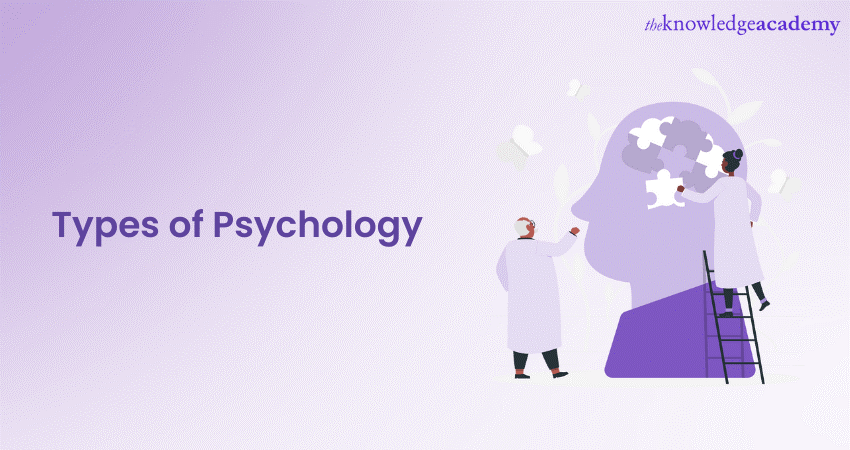
Psychology is like a key that unlocks the secrets of our minds and hearts. It helps us understand why we think, feel, and act the way we do. From exploring different personalities to figuring out what makes relationships work, each type of Psychology offers a unique insight.
This blog will introduce you to 29 exciting branches of Psychology, showing how they help us navigate our inner world. So, let's dive in and discover the fascinating ways Psychology shapes our lives!
Table of Contents
1) What is Psychology?
2) History of Psychology
3) Different Types of Psychology
4) How to become a Psychologist?
5) How do the Different Types of Psychology Interconnect?
6) Can Someone Specialise in More Than one Type of Psychology?
7) Conclusion
What is Psychology
Psychology is the scientific study of the Human Mind, behaviour, and Mental Processes. It aims to understand, explain, and predict human behaviour, thoughts, and emotions. The origins of Psychology as a study can be traced back to ancient civilisations, where philosophers pondered the nature of the mind and human behaviour. The emergence of Modern Psychology can be attributed to key figures such as Wilhelm Wundt, who established the first Psychology laboratory in 1879.

History of Psychology
Now let’s have a look at the overview of the History of Psychology in these three major schools:
a) Behaviourism
b) Humanism
c) Cognitive theory
Behaviourism
Behaviourism thrived in the United States at the beginning of the 1930s. B.F. Skinner was setting the pace in exhibiting the power of operant conditioning with reinforcement. Skinner and his followers plainly excluded mental life, seeing the human mind as an unbreakable “black box” which is open only to conjecture and speculative fiction. Their work explained that social behaviour is easily affected by manipulating certain unforeseen circumstances and by altering the outcomes and rewards. Similarly, varieties of emotions, whether it is positive or negative, may be obtained by the process of behaviour modifications and can be changed with the application of the same principles.
Humanism
Carl Rogers and Abraham Maslow did not agree with Psychoanalysis and Behaviourism. They considered that thoughts and actions are managed by free will and the capacity of an individual for development. Humanists give importance to emotions and think people are normally good. The concept of this humanism approach shows that humans have an inherent desire to reach personal fulfilment or become the best version of themselves. According to humanists, reaching this level is not an easy task, and there are various other factors, such as psychosocial needs, that an individual must take into consideration before chasing personal-fulfilment.
Cognitive theory
Cognitive theory was introduced in the 1970s and this is one of the most recent theoretical frameworks in Psychology. Cognitive theorists think that we receive information from our atmosphere by our senses and then handle the data by managing it, remembering it, manipulating it and connecting it to information we have already obtained in our mind.
Gain in-depth insight into work-related attitudes, values and perceptions in our Psychology of Behaviour at Work Training – register now!
Different Types of Psychology
Major branches of Psychology refer to the distinct areas or subfields within the discipline that focus on specific aspects of Human Behaviour, cognition, and Mental Processes. These branches represent specialised areas of study and research that contribute to our understanding of the complexities of the human mind.
Each branch emphasises different aspects of Human Behaviour, such as Mental Health, cognition, growth and development, social interactions, and the influence of various factors. Studying these branches allows researchers and practitioners to gain insights into specific domains of Human Psychology and apply their knowledge to various practical and theoretical contexts. Some of the major Types of Psychology are as follows:
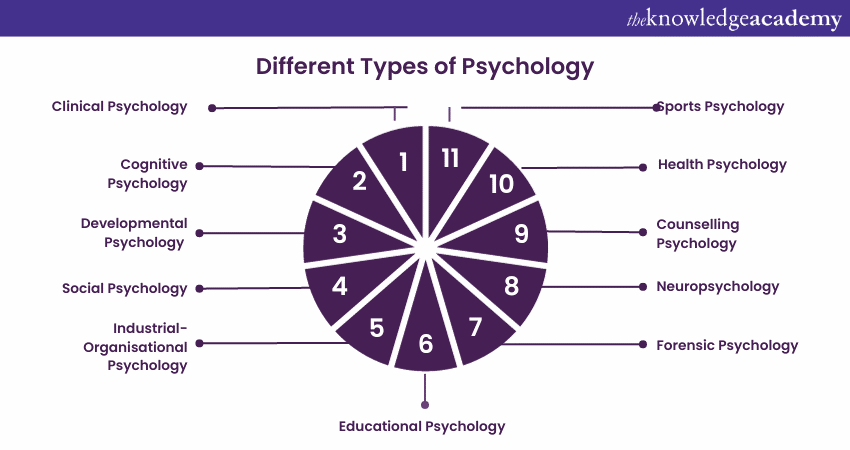
Abnormal Psychology
This specialisation focuses on studying Psychological Disorders and atypical behaviours. It seeks to understand the causes, symptoms, and treatment of these conditions, aiming to promote Mental Health and well-being.
Behavioural Psychology
Behavioural Psychology mainly focuses on understanding one of the most basic types of human actions. Behavioural Psychologists carry out research to understand what compels Human Behaviour and how the mind links with behaviour. This type of Psychology may include enhancing negative behaviour like addictions.
Biopsychology
Biopsychology is an integrative Type of Psychology that inspects how the brain, neurotransmitter and other factors of biology affect Human Behaviour, feelings and thoughts. This type of Psychology is also called Psychological Psychology, Psychobiology or Behavioural Neuroscience. Biopsychologists often analyse how biological procedures engage with cognitions, emotions and other Mental Functions.
Clinical Psychology
Clinical Psychology focuses on assessing, diagnosing, and treating mental disorders and psychological distress.
Consider the following points:
a) Clinical Psychologists employ various therapeutic approaches to help individuals improve their emotional and Mental Health.
b) These professionals work with clients to address issues such as anxiety, depression, trauma, and relationship difficulties.
c) Clinical Psychologists often work in hospitals, research settings, Mental Health clinics, or private practice.
d) They conduct Psychological assessments, provide Psychotherapy, and collaborate with other healthcare professionals in different fields to provide care and ensure the well-being of patients.
Cognitive Psychology
Cognitive Psychology explores mental processes, including:
a) Memory
b) Language
c) Perception
d) Attention
e) Problem-solving
It investigates how individuals acquire, process, and use information.
Cognitive Psychologists use experimental methods and Psychological theories to study cognitive phenomena. They examine topics like:
a) Cognitive development
b) Decision-making
c) Impact of cognitive processes on behaviour
Cognitive Psychology provides insights into human thought processes, memory formation, and cognitive biases. It has practical applications in fields like education, human-computer interaction, and clinical settings where understanding and improving cognitive functioning is crucial.
Counselling Psychology
Counselling Psychology focuses on helping individuals navigate personal, social, and emotional challenges. It involves providing therapy, guidance, and support to promote Mental Health, personal growth, and well-being. Counselling Psychologists work with clients to address a wide range of issues, such as problems regarding:
a) Career transitions
b) Relationships
c) Stress Management
d) Self-esteem
They employ various therapeutic approaches to facilitate positive change and help individuals develop coping strategies and effective problem-solving skills. This form of Psychology is practised in settings such as: Mental Health clinics
a) Hospitals
b) Schools
c) Private practices
Comparative Psychology
This specialisation compares and studies the behaviour and mental processes of different animal species. Exploring similarities and differences across species provides insights into the evolutionary and biological foundations of behaviour., This phylogenetic history leads to an understanding of the continuity and diversity of psychological processes.
Consumer Psychology
This specialisation investigates individuals' behaviour and decision-making processes in the context of purchasing and consuming goods and services. It examines factors influencing consumer choices, preferences, and responses to marketing strategies, helping businesses effectively understand and meet consumers' needs and desires.
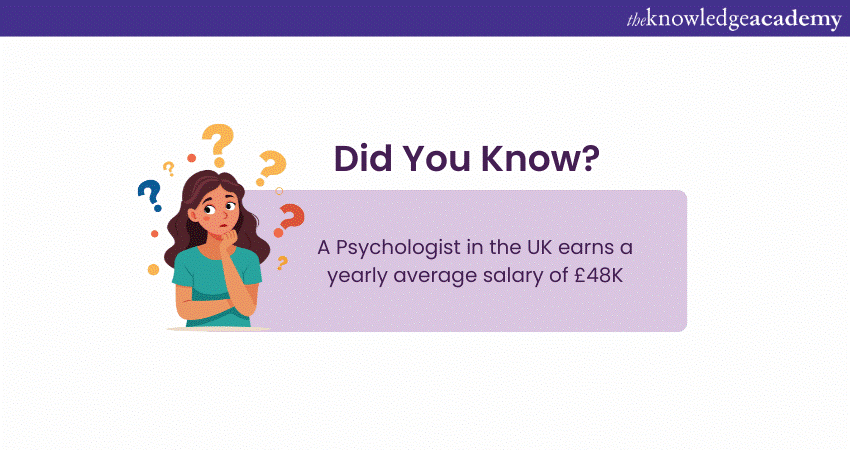
Cross-cultural Psychology
This specialisation examines the influence of culture on Human Behaviour, cognition, and development. It investigates how cultural factors shape individuals' thoughts, emotions, and actions, exploring both the universal aspects of Human Behaviour and the variations across different cultural groups, fostering cultural understanding and inclusivity.
Begin your career in Psychology with our comprehensive Psychology Course today – Sign up now!
Developmental Psychology
Developmental Psychology studies human growth and development of one's mind and thought process across the lifespan. It examines the following kinds of changes that occur from infancy to old age:
a) Physical
b) Cognitive
c) Emotional
d) Social
Developmental psychologists investigate development factors, including genetics, environment, and cultural influences.
They explore areas such as child psychology, adolescent transitions, and ageing processes. Developmental Psychology contributes to understanding how individuals change and mature over time, identifying critical milestones, and examining the impact of various experiences on development. This knowledge informs educational practices, parenting strategies, and interventions aimed at optimising human development.
Educational Psychology
Educational Psychology explores how individuals learn and grow within educational settings. It investigates factors that influence learning, instructional methods, motivation, and the assessment of learning outcomes. To better understand how to improve teaching and learning, Educational Psychologists study:
a) Cognitive processes
b) Learning theories
c) Developmental Psychology
Educational Psychologists may be involved in designing educational programs, conducting assessments, and providing guidance to teachers and administrators. Educational Psychology informs instructional strategies, curriculum development, and the creation of inclusive learning environments, ultimately improving educational practices and fostering optimal student development and achievement.
Environmental Psychology
This specialisation studies the interactions between individuals and their physical and social environments. It explores how the environment influences behaviour, well-being, and perception, examining topics such as the impact of natural and built environments on individuals' psychological processes and the promotion of sustainable and healthy environments.
Evolutionary Psychology
This specialisation explores how psychological processes have evolved to adapt to our environment. It investigates behaviours and cognitive functions from an evolutionary perspective, examining how they contribute to survival and reproductive success, shedding light on the biological and adaptive basis of Human Behaviour.
Learn to encourage mental well-being with our Mental Health and Wellbeing Training – Register now!
Experimental Psychology
This specialisation utilises controlled experiments to investigate various psychological phenomena. It explores areas such as perception, memory, learning, and decision-making, using empirical methods to uncover fundamental principles of Human Behaviour and cognition.
Forensic Psychology
Forensic Psychology applies psychological principles to legal and criminal justice contexts. It involves the application of Psychological knowledge in areas such as:
a) Criminal profiling
b) Eyewitness testimony
c) Assessment of individuals within the legal system
Forensic Psychologists may evaluate the competency of individuals to stand trial, assess risk, or provide expert testimony. They also work in correctional facilities, providing counselling and rehabilitation services to offenders. Forensic Psychology intersects with law enforcement, courts, and mental health services, aiming to contribute to the understanding and application within the legal and criminal justice systems.
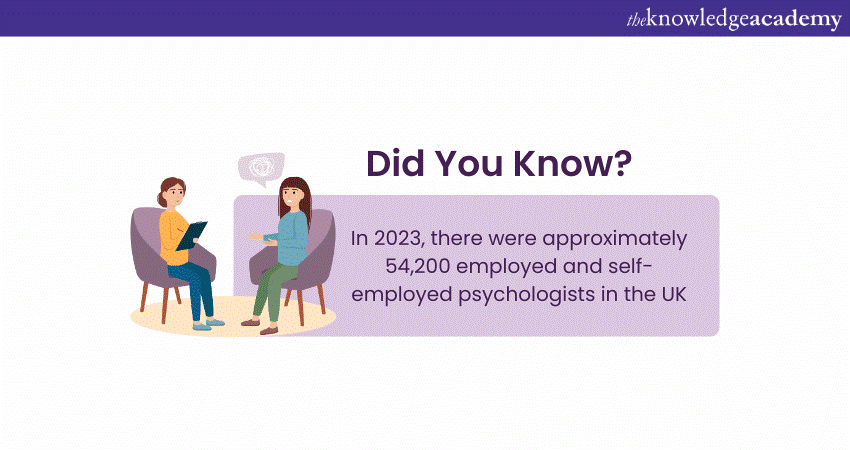
Health Psychology
Health Psychology examines the psychological factors that influence health, illness, and healthcare. It explores topics such as stress, health behaviours, coping mechanisms, and the mind-body connection. Health Psychologists investigate how psychological factors interact with biological, social, and environmental factors to impact physical well-being.
Health Psychologists may study health promotion, prevention, and adherence to medical treatments. Health Psychology informs strategies for behaviour change, patient education, and the development of interventions to improve health outcomes. Health Psychologists may work in healthcare settings, research institutions, or as part of interdisciplinary healthcare teams.
Industrial-organisational Psychology
Industrial-Organisational (I-O) Psychology applies psychological principles to the workplace. It focuses on areas such as employee selection, performance evaluation, motivation, leadership, and organisational behaviour. I-O psychologists strive to enhance productivity, employee satisfaction, and well-being in work settings.
They conduct research on topics like job satisfaction, team dynamics, and organisational culture. I-O psychologists may be involved in designing training programs, improving job satisfaction, implementing organisational change, and providing guidance on personnel selection and development strategies to optimise individual and organisational performance.
Military Psychology
Military Psychology applies psychological principles to understand and address the challenges faced by currently serving and retired military personnel. It focuses on areas such as combat stress, trauma, leadership, and resilience, aiming to support the psychological well-being, performance, and adjustment of military personnel and their families in military settings.
Media Psychology
Media Psychology examines the effects of media on individuals' behaviour, attitudes, and perceptions. It investigates how media influences individuals' thoughts, emotions, and behaviours, exploring topics such as media consumption, media literacy, and the psychological impact of media content, aiming to enhance our understanding of the role of media in society.
Neuropsychology
Neuropsychology studies the relationship between Brain function and Behaviour. It investigates how brain injuries, diseases, and neurological conditions impact cognitive abilities, emotions, and behaviour. Neuropsychologists use various psychological tools and techniques to evaluate cognitive functioning and assist in diagnosing and treating neurological disorders.
They may work with individuals who have experienced traumatic brain injuries, strokes, or neurodegenerative diseases. Neuropsychology contributes to understanding the Ways of Studying the Brain’s Psychology and informs rehabilitation approaches, cognitive interventions, and treatment planning for individuals with neurological conditions
Occupational Psychology
Occupational Psychology is the process of studying Human Behaviour in the workplace. It is a functional discipline within the Psychology field. Occupational Psychologists assist in organisations or companies' success by enhancing motivation, job satisfaction and performance. This type of Psychology also includes the overall health and safety of the workers. Occupational Psychologists conduct thorough research on the behaviours and the attitudes of the workers. They also find methods to improve their behaviours and attitudes with management systems, training programs and hiring practices.
Positive Psychology
This specialisation examines factors that contribute to well-being, happiness, and human flourishing. It emphasises positive emotions, character strengths, resilience, and the pursuit of a meaningful life, aiming to enhance individuals' overall Psychological well-being and quality of life.
Personality Psychology
This Type of Psychology involves studying an individual’s personality. Personality Psychologists carry out research based on personality traits, biology, evolution, humanism, social learning and behaviour in order to determine what makes a human unique. They also understand how personality grows and its similarities as variances. Personality Psychologists analyse, detect and treat personality disorders that negatively affect an individual’s quality of life.
Master the complex art of reducing stress and building resilience in our Mindfulness Training – Sing up now!
Psychometric Psychology
Psychometric Psychology, also known as psychometrics, is a subfield of Psychology that focuses on the measurement of psychological attributes through Psychological tests. These tests are particularly helpful in Child Development, as they help understand children’s cognitive and emotional growth. There are some examples of these tests, such as aptitude or IQ tests, that help in measuring a person’s intelligence and capability to perform specific tasks.
Rehabilitation Psychology
Rehabilitation Psychology is all about studying and using Psychology to help people who have disabilities because of accidents or illnesses. Rehabilitation Psychologists work in teams to figure out and treat problems with thinking, feelings, and daily activities. They help individuals to get past obstacles that might stop them from taking part in their everyday lives. These Psychologists do practical work, research, and speak up for people with disabilities, all with the main aim of helping them become more independent and have more chances in life.
Research Psychology
Research Psychology is also known as experimental Psychology, in which Psychologists study human memory, attention, decision-making, learning, sensation, perception and emotion. Research Psychologists usually publish their discoveries and share their outcomes with others in this field in order to provide significant information that enhances industry knowledge. This process also includes creating and analysing experiments and developing assumptions.
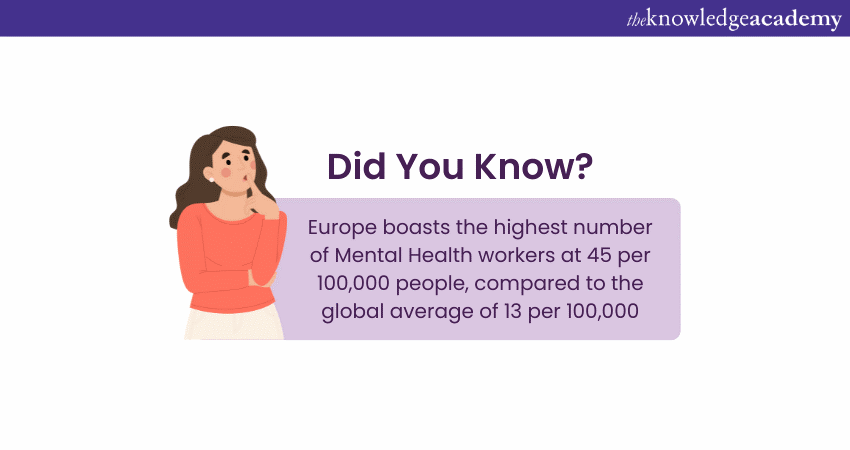
Social Psychology
Social Psychology investigates how social interactions and the presence of others influence individuals' thoughts, feelings, and behaviours. It examines topics such as social perception, attitudes, conformity, group dynamics, and interpersonal relationships.
Social Psychologists study how people form impressions of others, how social norms influence them, and how they navigate social situations. They explore phenomena like obedience, persuasion, prejudice, and cooperation. Understanding Social Psychology helps shed light on human behaviour in social contexts and informs fields such as marketing, organisational behaviour, and intergroup relations.
Sports Psychology
Sports Psychology applies psychological principles to enhance athletic performance, motivation, and mental well-being in sports. It focuses on areas such as goal setting, concentration, confidence, and managing performance-related stress. Sports Psychologists may work with individual athletes, teams, or sports organisations to optimise performance and well-being.
These professionals may provide techniques for improving focus, reducing anxiety, and enhancing motivation. Sports Psychology involves understanding the psychological aspects of sports, such as the impact of mental states on physical performance and the development of effective strategies for athletic success.
School Psychology
This specialisation focuses on supporting students' academic and social-emotional development within educational settings. School Psychologists address issues such as learning disabilities, behaviour problems, and Mental Health concerns, promoting a positive school climate and providing interventions that improve students' well-being and educational outcomes.
How to Become a Psychologist?
Becoming a psychologist involves several key steps, each requiring dedication and time. Here’s a general roadmap:
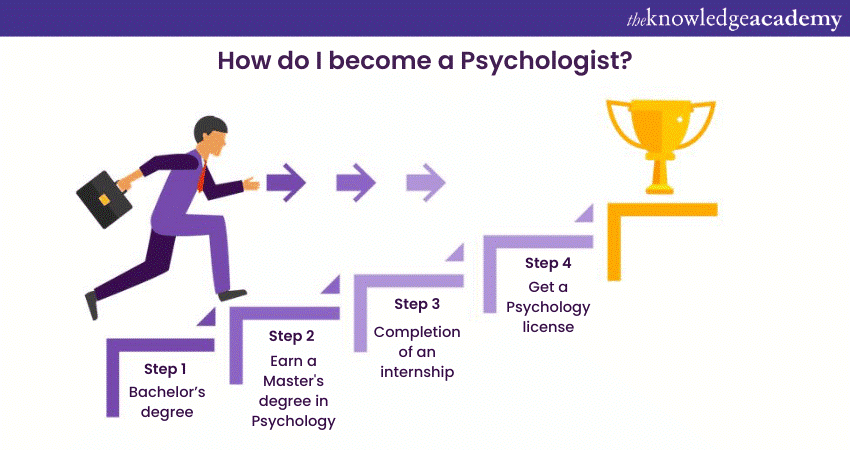
1) Earn a Bachelor’s Degree: Start with a bachelor’s degree in Psychology or a related field. This foundational education covers topics like cognitive processes, developmental Psychology, and research methods.
2) Pursue a Master’s Degree: While not always required, a master’s degree can provide specialised knowledge and improve your chances of getting into a doctoral program.
3) Complete Supervised Clinical Training: Gain practical experience through internships or supervised clinical practice.
4) Pass Licensing Exams: After completing your education and training, you must pass state-specific licensing exams to practice as a Psychologist.
5) Meet State-specific Requirements: Each state has its own licensing requirements, so ensure you meet all criteria for the state where you plan to practice.
6) Consider Board Certification (Optional): While optional, board certification in a specialty area can enhance your credentials and career prospects.
How do the Different Types of Psychology Interconnect?
Many types of Psychology overlap. For example, cognitive Psychology informs clinical practices, while social Psychology increases our understanding of group dynamics in organisational or cultural settings. Together, they provide a fuller view of human behaviour.
Can Someone Specialise in More Than one Type of Psychology?
Yes, many Psychologists incorporate multiple branches into their practice. For instance, a Forensic Psychologist can apply clinical and Cognitive Psychology principles, and an Educational Psychologist can apply social Psychology to support learning environments.
Conclusion
It's amazing to see how each branch of Psychology helps us understand our thoughts, feelings, and actions. Whether you're curious about different personalities, the science of relationships, or just how our minds work, exploring Psychology Facts can offer fascinating insights. Remember, learning about Types of Psychology isn't just about facts—it's about finding tools to better navigate our own lives. So, stay curious, keep exploring, and let the wonders of psychology guide you on your path to self-discovery
Dive into the various concepts of motivation in our Psychological Skills Training for Human Wellness Training – Sign up now!
Frequently Asked Questions
What are Different Psychology Careers?

There are various promising Psychology careers, including the following:
a) Aviation Psychologists
b) Biopsychologists
c) Clinical Psychologists
d) Cognitive Psychologists
e) Counselling Psychologists
f) Cross-Cultural Psychologists
g) Educational Psychologists
h) Engineering Psychologists
i) Environmental Psychologists
j) Forensic Psychologists
What is the Highest-paying Job in Psychology?

The highest-paying job in Psychology is that of a Psychiatrist.
What are the Other Resources and Offers Provided by The Knowledge Academy?

The Knowledge Academy takes global learning to new heights, offering over 3,000 online courses across 490+ locations in 190+ countries. This expansive reach ensures accessibility and convenience for learners worldwide.
Alongside our diverse Online Course Catalogue, encompassing 19 major categories, we go the extra mile by providing a plethora of free educational Online Resources like News updates, Blogs, videos, webinars, and interview questions. Tailoring learning experiences further, professionals can maximise value with customisable Course Bundles of TKA.
What is The Knowledge Pass, and How Does it Work?

The Knowledge Academy’s Knowledge Pass, a prepaid voucher, adds another layer of flexibility, allowing course bookings over a 12-month period. Join us on a journey where education knows no bounds.
What are the Related Courses and Blogs Provided by The Knowledge Academy?

The Knowledge Academy offers various Mental Health Courses, including the Mental Capacity Training and the Prevention Psychology Training. These courses cater to different skill levels, providing comprehensive insights into Reverse Psychology.
Our Health & safety Blogs cover a range of topics related to Psychology, offering valuable resources, best practices, and industry insights. Whether you are a beginner or looking to advance your Psychology expertise, The Knowledge Academy's diverse courses and informative blogs have got you covered.
Upcoming Health & Safety Resources Batches & Dates
Date
 Psychology Course
Psychology Course
Fri 11th Apr 2025
Fri 13th Jun 2025
Fri 15th Aug 2025
Fri 10th Oct 2025
Fri 12th Dec 2025






 Top Rated Course
Top Rated Course


 If you wish to make any changes to your course, please
If you wish to make any changes to your course, please


